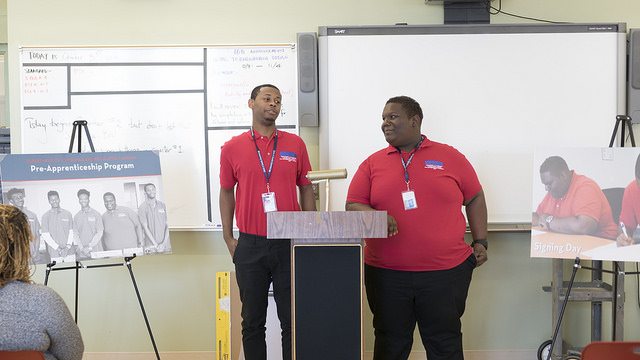The D.C. Department of Consumer and Regulatory Affairs (DCRA) has hired two new housing code inspectors out of high school, as part of an effort to train and hire District residents. Daniel Gibson and Quanya Reese, graduates of the DCRA pre-apprenticeship program at Dunbar High, were honored at an Oct. 31 event that sought to recruit more students to the program.
Reese and Gibson, along with five other students from the Drew Engineering Academy at Dunbar, participated in the first year of pre-apprenticeship in 2016. Students started training in April and spent six weeks this summer shadowing housing inspectors. DCRA Director of Legislative and Public Affairs Matt Orlins said Dunbar High School was chosen for the initiative because of their strong engineering program. “The agency is exploring whether and when it could expand the program to include additional partners,” he said.
Reese and Gibson spoke positively of the program and their new jobs. “I’m not a people person, but they taught me how to speak in front of a lot of people,” said Gibson. “We learned how to read permits, how to map out your whole city, how to see something wrong in a house.”
Reese described visiting apartments infested with bugs and lacking air conditioning or running water where owners still charged tenants rent. “Some apartments were beautiful on the outside, but on the inside the people were living like they were on the street,” he said. “As a housing inspector, I could ensure that all renters have a good living space.”
The students were paid through the Marion S. Barry Summer Youth Employment Program which is funded and run by the Department of Employment Services. According to Orlins, the pre-apprenticeship program does not have its own budget. DCRA inspectors and partners volunteer to teach classes at the National Capital Region Building Code Academy alongside their regular duties.
At the event, Deputy Mayor of Economic Development Brian Kenner introduced the two students and said that the main goals of his position are increasing affordable housing and tax revenue and getting jobs for residents. “This program is awesome because it gives you that kind of work experience and that kind of opportunity while you’re still in high school,” he said, emphasizing the connection between education and employment. “You will by far make more money throughout your life using education as your base more than anything else.”
While shadowing certified inspectors, participants dealt with elevator maintenance, electrical systems, plumbing systems, mechanical systems, and building inspections, according to DCRA Deputy Director Lori Pariss. “They actually went out in the field and actually saw what we do every single day,” she said. “They learned firsthand what it is to keep D.C. residents safe in their homes and in their communities.”
In January, the ten participants from Dunbar will start classes in housing code enforcement. “The earlier start date will allow our pre-apprentices an even stronger foundation to contribute when they begin working with the inspectors in the field during the summer,” Pariss said.
The program is designed to prepare students for both college or direct hire by DCRA. Fifty percent of D.C. public and charter school students go on to college within 6 months of graduation, based on data from the 2011-2012 school year, according to the Office of the State Superintendent for Education
Although pre-apprenticeship participants are not currently granted certifications upon graduation from the program, Orlins said that they would like to expand the program in the future to do so.
DCRA and school administrators emphasized the housing inspector starting salary of $42,000 per year as a selling point to students, and said that the soft skills of the pre-apprenticeship program are applicable for any career or in college. “We’re also going to teach participants how to speak and relate to people professionally,” Pariss said.
Reese agreed that he had learned valuable skills from the program, gaining both concrete expertise in building codes and strengthening broader abilities. “You have to handle things as an adult,” he said of his new job.








